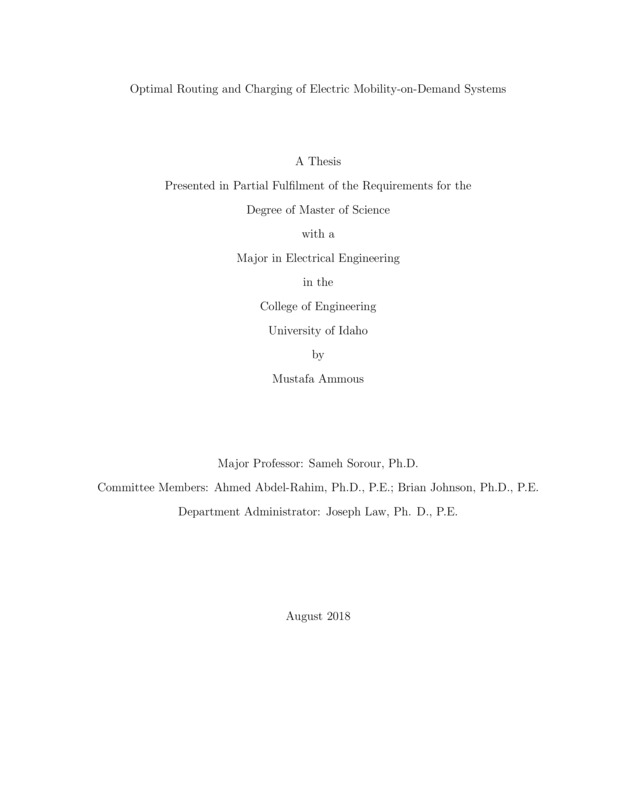Optimal Routing and Charging of Electric Mobility-on-Demand Systems
Ammous, Mustafa. (2018-08). Optimal Routing and Charging of Electric Mobility-on-Demand Systems. Theses and Dissertations Collection, University of Idaho Library Digital Collections. https://www.lib.uidaho.edu/digital/etd/items/ammous_idaho_0089n_11420.html
- Title:
- Optimal Routing and Charging of Electric Mobility-on-Demand Systems
- Author:
- Ammous, Mustafa
- Date:
- 2018-08
- Keywords:
- Charging electric vehicles Mobility-on-demand Routing smart cities
- Program:
- Electrical and Computer Engineering
- Subject Category:
- Engineering
- Abstract:
-
Mobility-On-Demand (MoD) systems using electric vehicles (EVs) are expected to play a significantly increasing role in the near future of urban transportation systems, to both cope with the massive increases in urban population and reduce carbon emissions. One inconvenience in MoD-EV systems is the need for some customers to charge the vehicles for almost out of charge EVs before reaching their destinations. In this thesis, we propose three different routing models that aim to reduce this inconvenience by minimizing the relative excess time spent by MoD-EV systems customers in charging compared to the on-road trip time. In the first model, the routing problem between multiple MoD-EV stations with in-route charging as a multi-server queuing system is considered. We formulate our objective as a stochastic convex optimization problem that minimizes the average overall trip time for all customers relatively to their actual trip time without in-route charging. Both single and multiple charging units per charging station are considered, and modeled as M/M/1 and M/M/c queues, respectively. In the second model, a cost on the charging is added in the process and the objective is to minimize the total trip time with charging relative to the time without charging as well as reducing the total cost of charging. The problem is modeled also as convex optimization with two objectives, and is solved also for both types of queues M/M/1 and M/M/c. In the third model, two options of charging are considered in the routing scheme of the first model. Customers can charge either at the pick-up locations or perform in-route charging. Obviously, charging all the EVs at the pick-up locations might not be the best solution as the delay may go large or even unbounded. Hence, an optimization problem needs to be solved to determine which customers will charge at the pick-up locations and which will perform in-route charging with the objective to minimize the average total trip time for all the customers. It is modeled also as a convex optimization problem. In all the models, the optimal routing proportions are derived analytically using Lagrangian analysis and Karush-Kuhn-Tucker (KKT) conditions. Simulation results show the merits of our proposed solution in all cases as compared to the shortest time and the random routing decisions.
- Description:
- masters, M.S., Electrical and Computer Engineering -- University of Idaho - College of Graduate Studies, 2018-08
- Major Professor:
- Sorour, Sameh
- Committee:
- Johnson, Brian; Abdel-Rahim, Ahmed
- Defense Date:
- 2018-08
- Identifier:
- Ammous_idaho_0089N_11420
- Type:
- Text
- Format Original:
- Format:
- application/pdf
- Rights:
- In Copyright - Educational Use Permitted. For more information, please contact University of Idaho Library Special Collections and Archives Department at libspec@uidaho.edu.
- Standardized Rights:
- http://rightsstatements.org/vocab/InC-EDU/1.0/

